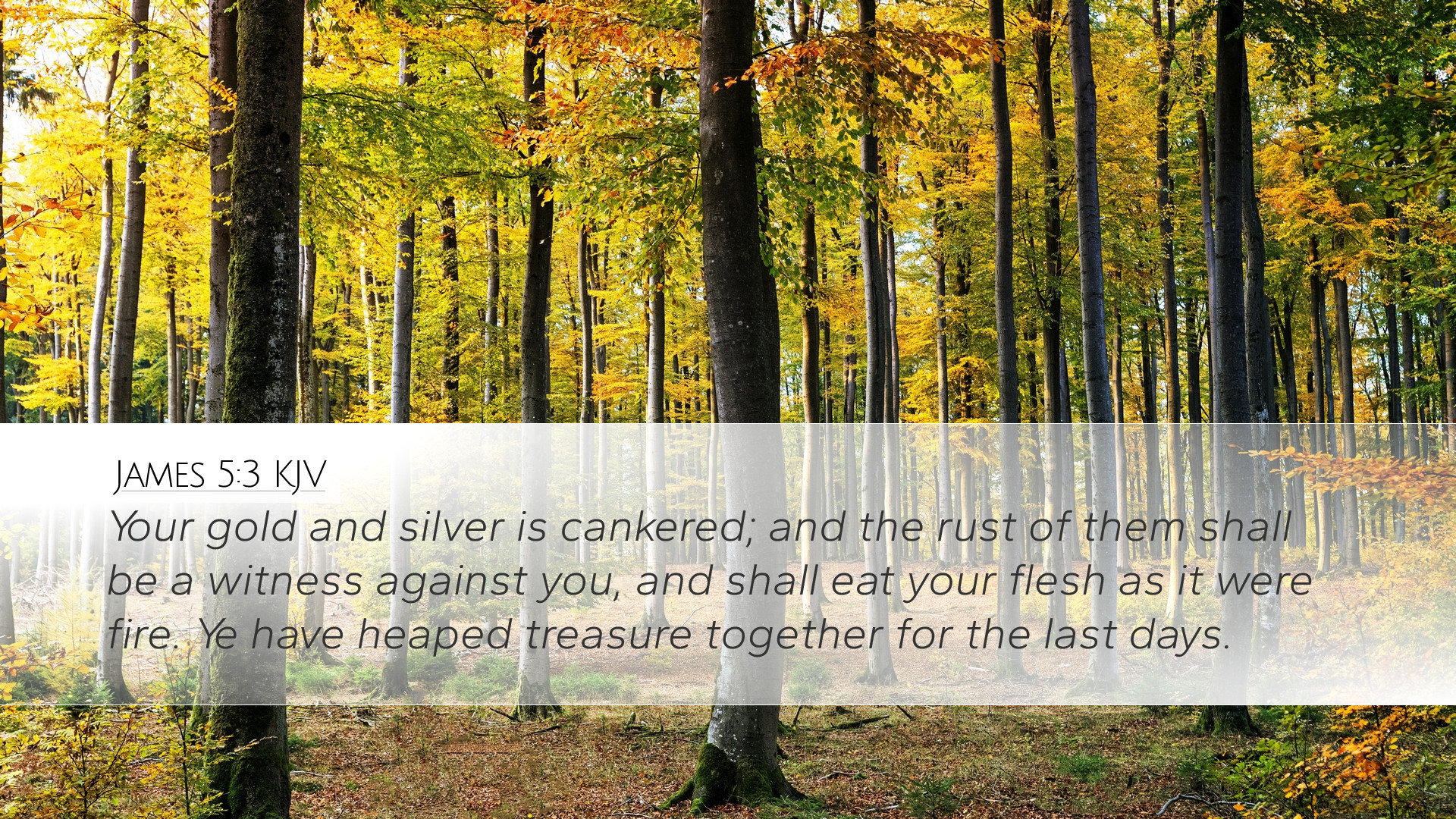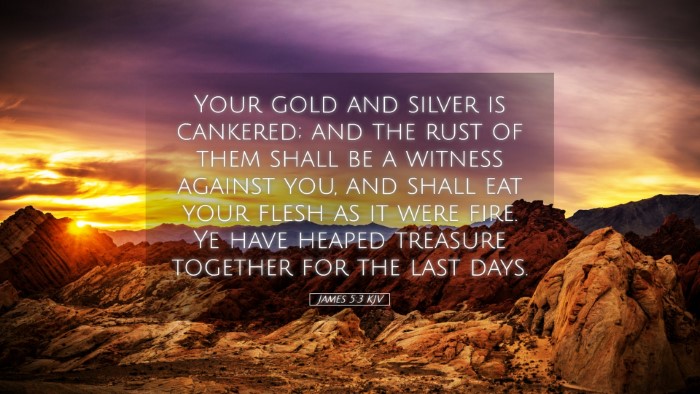Old Testament
Genesis Exodus Leviticus Numbers Deuteronomy Joshua Judges Ruth 1 Samuel 2 Samuel 1 Kings 2 Kings 1 Chronicles 2 Chronicles Ezra Nehemiah Esther Job Psalms Proverbs Ecclesiastes Song of Solomon Isaiah Jeremiah Lamentations Ezekiel Daniel Hosea Joel Amos Obadiah Jonah Micah Nahum Habakkuk Zephaniah Haggai Zechariah MalachiJames 5:3
James 5:3 KJV
Your gold and silver is cankered; and the rust of them shall be a witness against you, and shall eat your flesh as it were fire. Ye have heaped treasure together for the last days.
James 5:3 Bible Commentary
Commentary on James 5:3
James 5:3 (KJV): "Your gold and silver is cankered; and the rust of them shall be a witness against you, and shall eat your flesh as it were fire. Ye have heaped treasure together for the last days."
Introduction
The epistle of James comprises practical teachings for the Christian community, focusing on conduct, faith, and the dangers of materialism. In the context of James 5:3, the Apostle addresses the wealthy who are accumulating riches at the expense of righteousness and the well-being of others. This verse serves as a poignant reminder of the ephemeral nature of earthly wealth and its implications in the light of eternal judgment.
Wealth and Its Consequences
Matthew Henry notes that the imagery in this verse starkly depicts the futility of hoarding wealth. He explains that the “cankered” condition of gold and silver symbolizes not just physical decay but also moral and spiritual corruption that accompanies excessive wealth. This decay testifies against the wealthy, revealing their misplaced priorities.
Albert Barnes reinforces this idea by emphasizing the judgment that comes upon those who misuse their resources. He states that wealth, when unjustified or ill-gotten, becomes a burden rather than a blessing. The “rust” signifies not merely a physical deterioration but a deeper moral decay reflecting one's character, priorities, and concerns for others.
Adam Clarke takes this further by interpreting the “rust” as a symbol of the impending divine judgment that these individuals will face. Clarke argues that the resulting testimony of their wealth will not serve as a refuge in times of need but will instead expose them at the last day for their failure to use resources justly.
The Last Days Context
In mentioning the “last days,” James invokes eschatological themes to provoke urgency. Matthew Henry asserts that such a reminder encourages believers to evaluate their lives in light of the coming kingdom of God. This perspective is not just about impending doom but also about accountability in the stewardship of wealth during one’s earthly journey.
Albert Barnes further elaborates that understanding the transient nature of worldly riches should compel believers to use their resources for godly purposes, such as aiding the needy and spending on eternal investments. The age in which we live should motivate us to prioritize spiritual riches over material wealth.
Adam Clarke emphasizes the contrast between earthly treasure and heavenly reward, urging believers to recognize the value in investing eternally rather than accumulating material possessions that inevitably decay. He suggests that the steward of wealth should focus on spiritual health and community enrichment as eternal rewards far surpass worldly gain.
Implications for Today’s Believers
This verse’s application transcends its historical context, resonating deeply with contemporary society's materialistic tendencies. Matthew Henry urges us to reflect on our attitudes towards wealth, prompting a charge for integrity and generosity. He highlights that the Christian stance should reject greed and exploitation, advocating for a life characterized by love and service to others.
- Reflection on Priorities: In a culture that often equates worth with wealth, this passage calls for a re-evaluation of what we cherish most.
- Stewardship over Ownership: See resources not as possessions to hoard but as tools for furthering God's Kingdom.
- Urgency in Action: Recognize the limited time we have to enact change and leverage our resources for the good of others.
Albert Barnes reminds us that our eternal destinies may be significantly influenced by how we manage worldly possessions. Thus, the practice of generosity is essential. Generosity reveals our trust in God’s provision and our commitment to His Kingdom.
Adam Clarke concludes that believers should avoid materialism’s snares, positioning their lives towards faith-based investments that yield not just temporal benefits, but eternal rewards. The wisdom of this passage serves as an urgent clarion call to examine the nature of our desires and the impact of our living on the lives of those around us.
Conclusion
James 5:3 serves as a solemn warning for the affluent who prioritize wealth over righteousness. The decay of material possessions represents not only a loss of value but a spiritual barrenness where true treasure lies in the service of others and the dedication to God’s will. As we navigate our lives, let us be reminded that wealth is transient and that we are called to treasure what is eternal.
As pastors, students, theologians, and scholars reflect on this passage, we are encouraged to lead lives marked by faithfulness in stewardship, ensuring that we invest our lives in pursuits that align with divine principles, emphasizing love, generosity, and the urgent reality of our heavenly calling.


